Impact of Work Ethics on Employee Behavior in the Hotel Industry
VerifiedAdded on 2020/04/21
|18
|4180
|225
Report
AI Summary
This report investigates the impact of work ethics on employee behavior, specifically within the hotel industry, utilizing equity theory as a theoretical framework. It explores the significance of integrity, fairness, and trust in fostering positive employee conduct. The report delves into the problem of unethical practices in a competitive market, highlighting how work ethics influences managerial decisions, employee performance, and overall business success. It examines both dependent (work ethics) and independent (employee behavior) variables, analyzing how ethical considerations, employee actions, and consumer satisfaction are interconnected. The study emphasizes the importance of ethical surroundings, positive employee behaviors, and the role of uniforms in shaping employee conduct and customer experiences, ultimately providing insights into creating a productive and ethical work environment within the hotel sector.
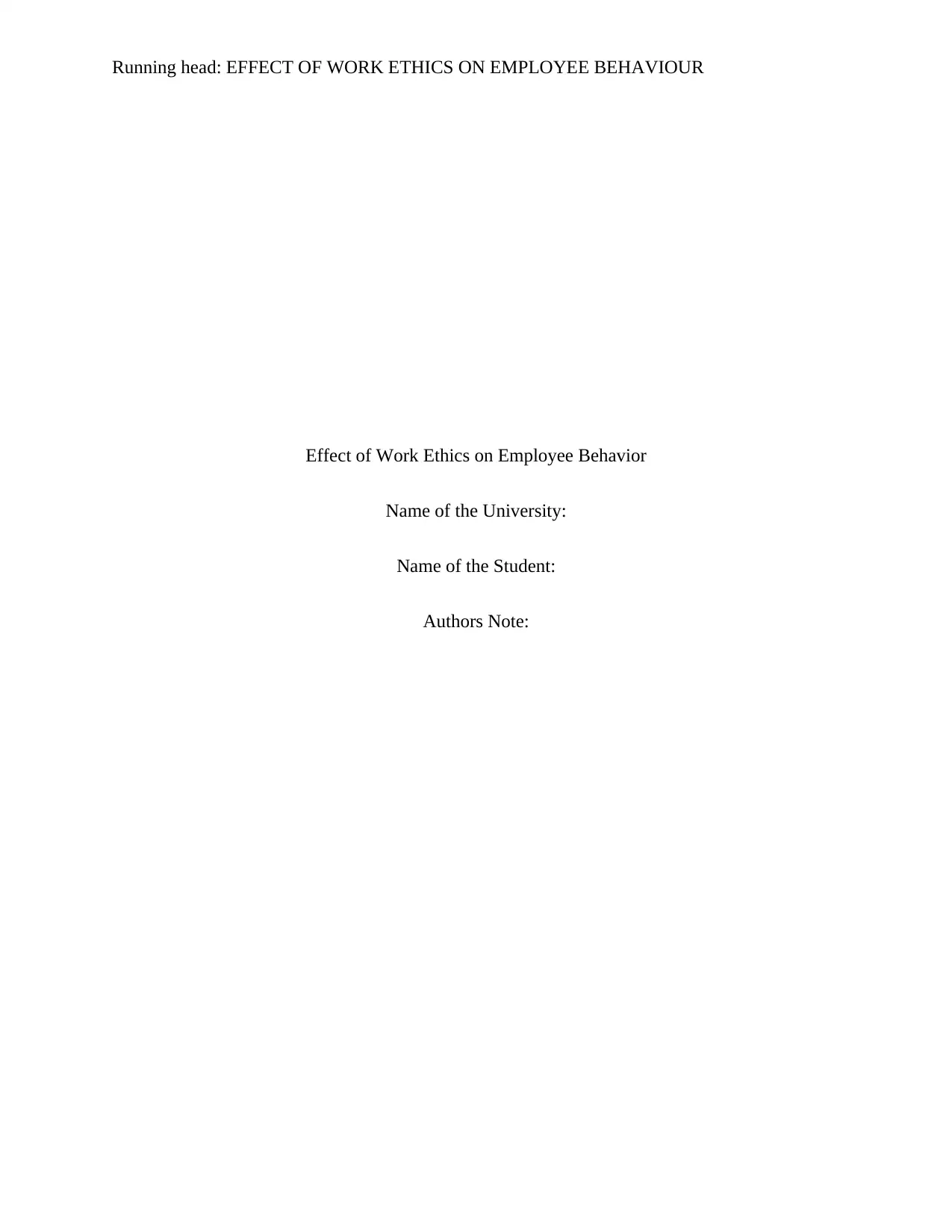
Running head: EFFECT OF WORK ETHICS ON EMPLOYEE BEHAVIOUR
Effect of Work Ethics on Employee Behavior
Name of the University:
Name of the Student:
Authors Note:
Effect of Work Ethics on Employee Behavior
Name of the University:
Name of the Student:
Authors Note:
Paraphrase This Document
Need a fresh take? Get an instant paraphrase of this document with our AI Paraphraser
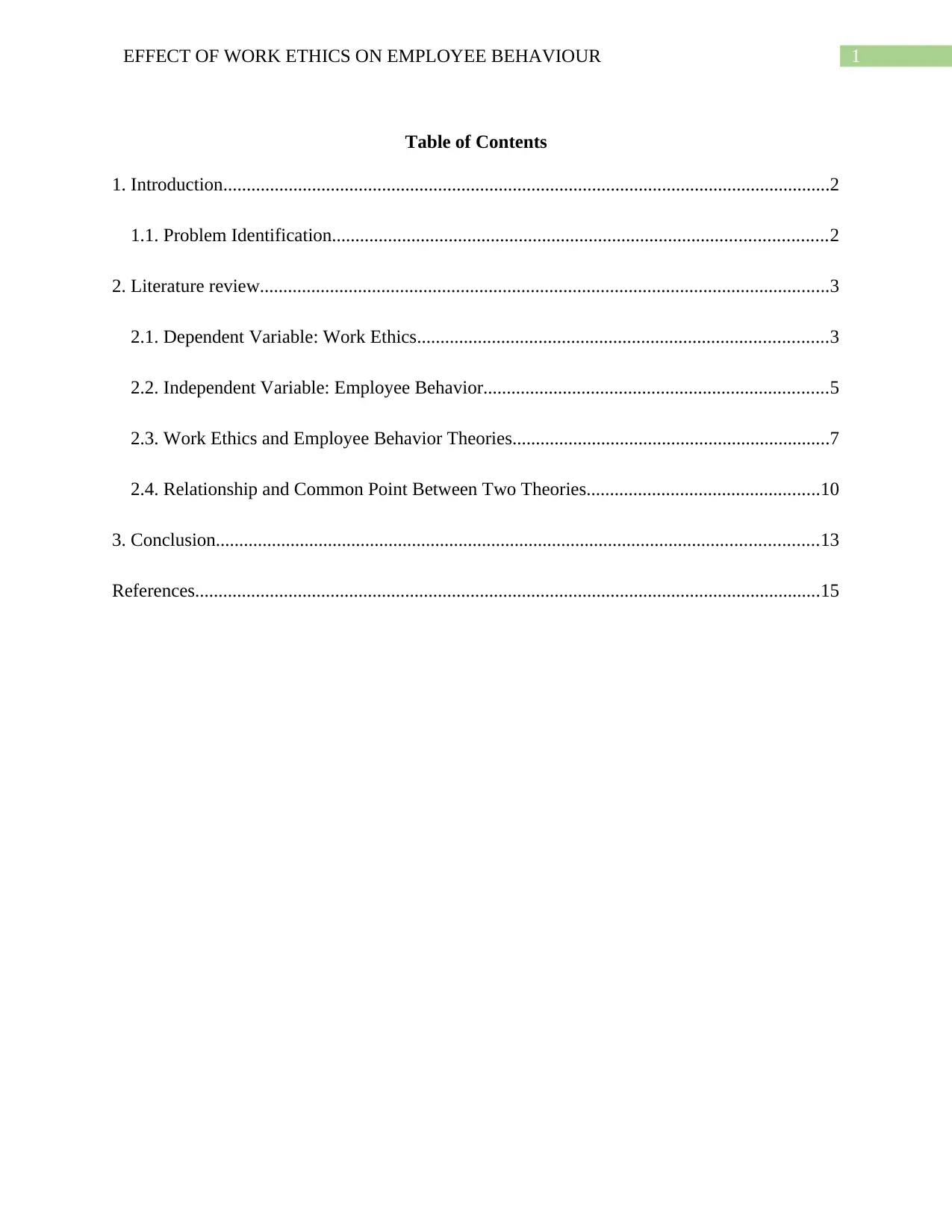
1EFFECT OF WORK ETHICS ON EMPLOYEE BEHAVIOUR
Table of Contents
1. Introduction..................................................................................................................................2
1.1. Problem Identification..........................................................................................................2
2. Literature review..........................................................................................................................3
2.1. Dependent Variable: Work Ethics........................................................................................3
2.2. Independent Variable: Employee Behavior..........................................................................5
2.3. Work Ethics and Employee Behavior Theories....................................................................7
2.4. Relationship and Common Point Between Two Theories..................................................10
3. Conclusion.................................................................................................................................13
References......................................................................................................................................15
Table of Contents
1. Introduction..................................................................................................................................2
1.1. Problem Identification..........................................................................................................2
2. Literature review..........................................................................................................................3
2.1. Dependent Variable: Work Ethics........................................................................................3
2.2. Independent Variable: Employee Behavior..........................................................................5
2.3. Work Ethics and Employee Behavior Theories....................................................................7
2.4. Relationship and Common Point Between Two Theories..................................................10
3. Conclusion.................................................................................................................................13
References......................................................................................................................................15
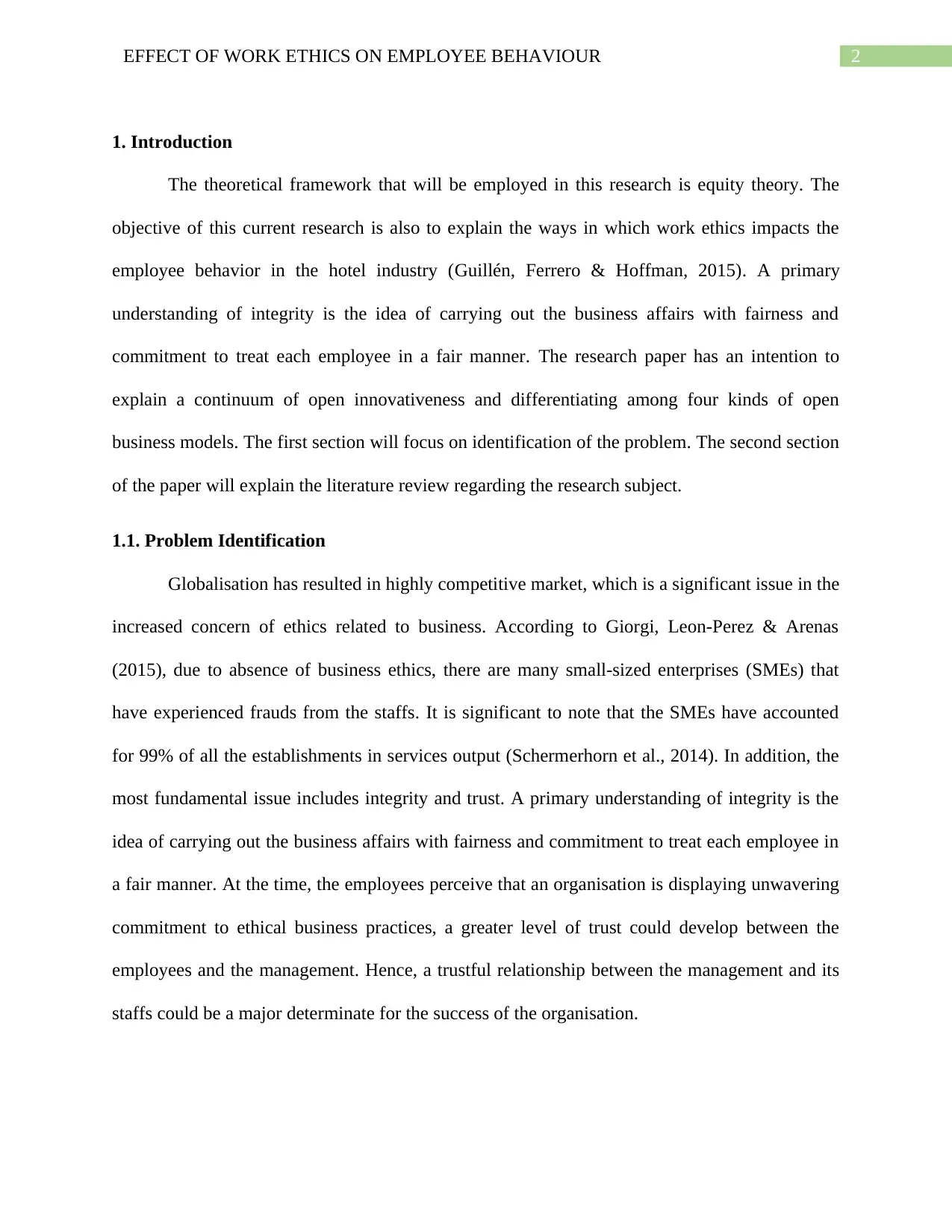
2EFFECT OF WORK ETHICS ON EMPLOYEE BEHAVIOUR
1. Introduction
The theoretical framework that will be employed in this research is equity theory. The
objective of this current research is also to explain the ways in which work ethics impacts the
employee behavior in the hotel industry (Guillén, Ferrero & Hoffman, 2015). A primary
understanding of integrity is the idea of carrying out the business affairs with fairness and
commitment to treat each employee in a fair manner. The research paper has an intention to
explain a continuum of open innovativeness and differentiating among four kinds of open
business models. The first section will focus on identification of the problem. The second section
of the paper will explain the literature review regarding the research subject.
1.1. Problem Identification
Globalisation has resulted in highly competitive market, which is a significant issue in the
increased concern of ethics related to business. According to Giorgi, Leon-Perez & Arenas
(2015), due to absence of business ethics, there are many small-sized enterprises (SMEs) that
have experienced frauds from the staffs. It is significant to note that the SMEs have accounted
for 99% of all the establishments in services output (Schermerhorn et al., 2014). In addition, the
most fundamental issue includes integrity and trust. A primary understanding of integrity is the
idea of carrying out the business affairs with fairness and commitment to treat each employee in
a fair manner. At the time, the employees perceive that an organisation is displaying unwavering
commitment to ethical business practices, a greater level of trust could develop between the
employees and the management. Hence, a trustful relationship between the management and its
staffs could be a major determinate for the success of the organisation.
1. Introduction
The theoretical framework that will be employed in this research is equity theory. The
objective of this current research is also to explain the ways in which work ethics impacts the
employee behavior in the hotel industry (Guillén, Ferrero & Hoffman, 2015). A primary
understanding of integrity is the idea of carrying out the business affairs with fairness and
commitment to treat each employee in a fair manner. The research paper has an intention to
explain a continuum of open innovativeness and differentiating among four kinds of open
business models. The first section will focus on identification of the problem. The second section
of the paper will explain the literature review regarding the research subject.
1.1. Problem Identification
Globalisation has resulted in highly competitive market, which is a significant issue in the
increased concern of ethics related to business. According to Giorgi, Leon-Perez & Arenas
(2015), due to absence of business ethics, there are many small-sized enterprises (SMEs) that
have experienced frauds from the staffs. It is significant to note that the SMEs have accounted
for 99% of all the establishments in services output (Schermerhorn et al., 2014). In addition, the
most fundamental issue includes integrity and trust. A primary understanding of integrity is the
idea of carrying out the business affairs with fairness and commitment to treat each employee in
a fair manner. At the time, the employees perceive that an organisation is displaying unwavering
commitment to ethical business practices, a greater level of trust could develop between the
employees and the management. Hence, a trustful relationship between the management and its
staffs could be a major determinate for the success of the organisation.
⊘ This is a preview!⊘
Do you want full access?
Subscribe today to unlock all pages.

Trusted by 1+ million students worldwide
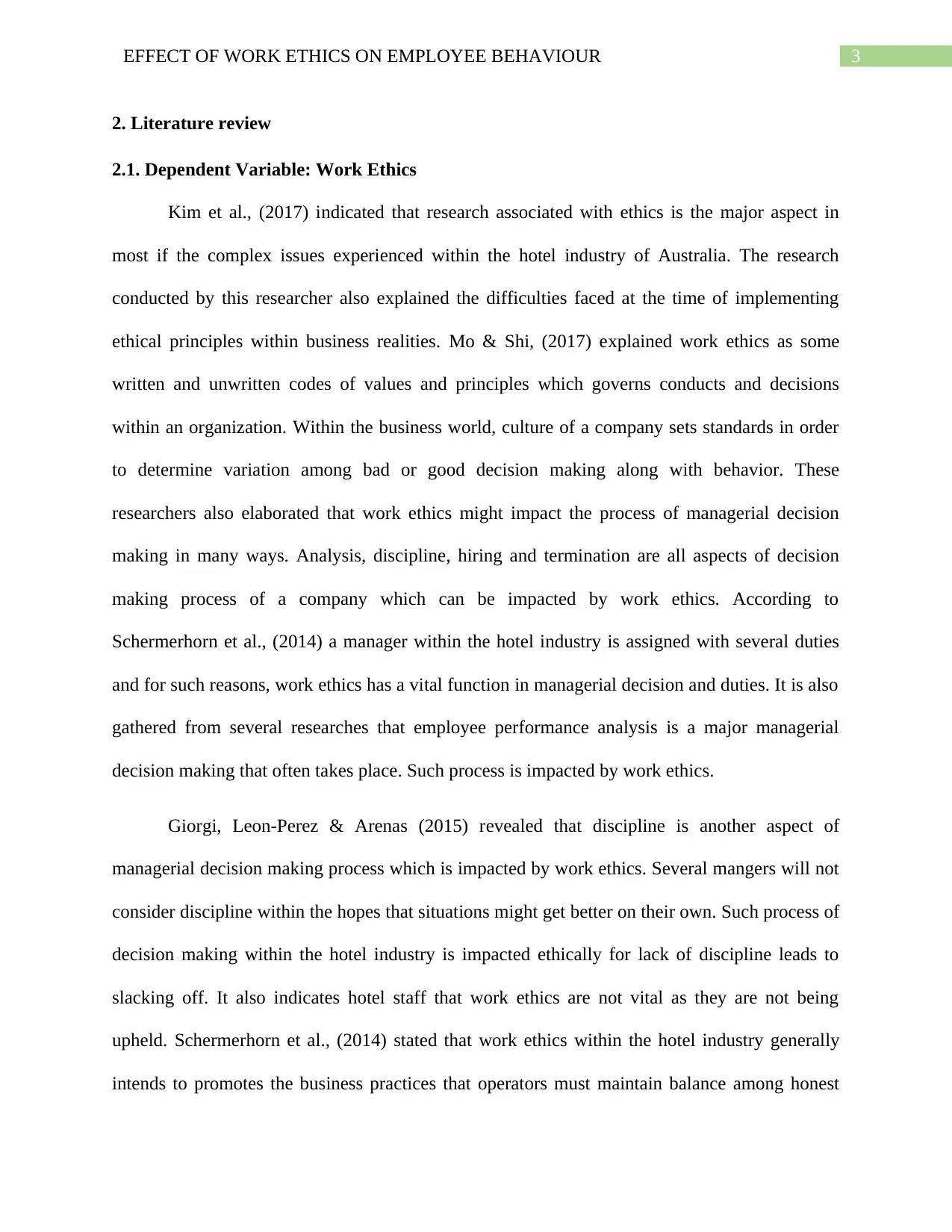
3EFFECT OF WORK ETHICS ON EMPLOYEE BEHAVIOUR
2. Literature review
2.1. Dependent Variable: Work Ethics
Kim et al., (2017) indicated that research associated with ethics is the major aspect in
most if the complex issues experienced within the hotel industry of Australia. The research
conducted by this researcher also explained the difficulties faced at the time of implementing
ethical principles within business realities. Mo & Shi, (2017) explained work ethics as some
written and unwritten codes of values and principles which governs conducts and decisions
within an organization. Within the business world, culture of a company sets standards in order
to determine variation among bad or good decision making along with behavior. These
researchers also elaborated that work ethics might impact the process of managerial decision
making in many ways. Analysis, discipline, hiring and termination are all aspects of decision
making process of a company which can be impacted by work ethics. According to
Schermerhorn et al., (2014) a manager within the hotel industry is assigned with several duties
and for such reasons, work ethics has a vital function in managerial decision and duties. It is also
gathered from several researches that employee performance analysis is a major managerial
decision making that often takes place. Such process is impacted by work ethics.
Giorgi, Leon-Perez & Arenas (2015) revealed that discipline is another aspect of
managerial decision making process which is impacted by work ethics. Several mangers will not
consider discipline within the hopes that situations might get better on their own. Such process of
decision making within the hotel industry is impacted ethically for lack of discipline leads to
slacking off. It also indicates hotel staff that work ethics are not vital as they are not being
upheld. Schermerhorn et al., (2014) stated that work ethics within the hotel industry generally
intends to promotes the business practices that operators must maintain balance among honest
2. Literature review
2.1. Dependent Variable: Work Ethics
Kim et al., (2017) indicated that research associated with ethics is the major aspect in
most if the complex issues experienced within the hotel industry of Australia. The research
conducted by this researcher also explained the difficulties faced at the time of implementing
ethical principles within business realities. Mo & Shi, (2017) explained work ethics as some
written and unwritten codes of values and principles which governs conducts and decisions
within an organization. Within the business world, culture of a company sets standards in order
to determine variation among bad or good decision making along with behavior. These
researchers also elaborated that work ethics might impact the process of managerial decision
making in many ways. Analysis, discipline, hiring and termination are all aspects of decision
making process of a company which can be impacted by work ethics. According to
Schermerhorn et al., (2014) a manager within the hotel industry is assigned with several duties
and for such reasons, work ethics has a vital function in managerial decision and duties. It is also
gathered from several researches that employee performance analysis is a major managerial
decision making that often takes place. Such process is impacted by work ethics.
Giorgi, Leon-Perez & Arenas (2015) revealed that discipline is another aspect of
managerial decision making process which is impacted by work ethics. Several mangers will not
consider discipline within the hopes that situations might get better on their own. Such process of
decision making within the hotel industry is impacted ethically for lack of discipline leads to
slacking off. It also indicates hotel staff that work ethics are not vital as they are not being
upheld. Schermerhorn et al., (2014) stated that work ethics within the hotel industry generally
intends to promotes the business practices that operators must maintain balance among honest
Paraphrase This Document
Need a fresh take? Get an instant paraphrase of this document with our AI Paraphraser
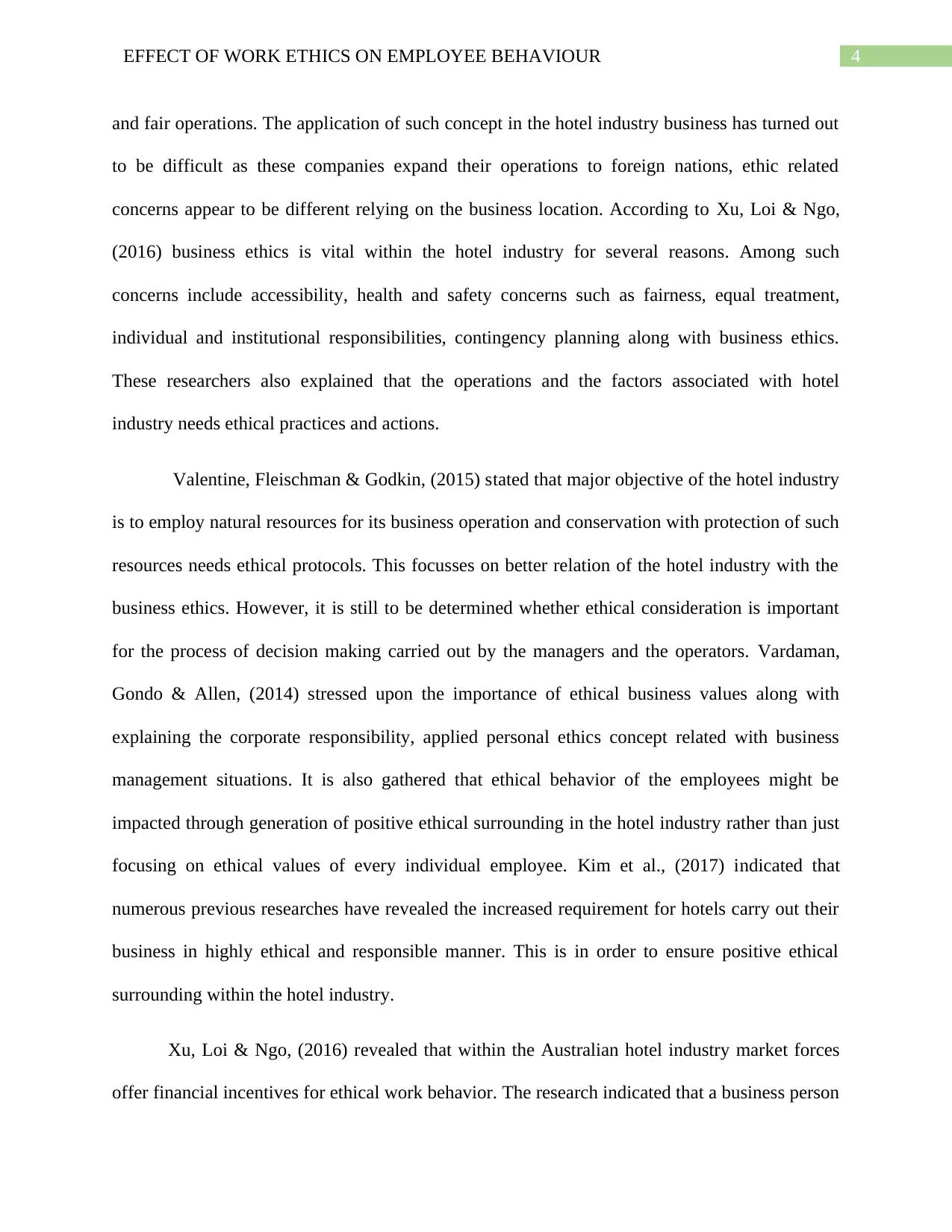
4EFFECT OF WORK ETHICS ON EMPLOYEE BEHAVIOUR
and fair operations. The application of such concept in the hotel industry business has turned out
to be difficult as these companies expand their operations to foreign nations, ethic related
concerns appear to be different relying on the business location. According to Xu, Loi & Ngo,
(2016) business ethics is vital within the hotel industry for several reasons. Among such
concerns include accessibility, health and safety concerns such as fairness, equal treatment,
individual and institutional responsibilities, contingency planning along with business ethics.
These researchers also explained that the operations and the factors associated with hotel
industry needs ethical practices and actions.
Valentine, Fleischman & Godkin, (2015) stated that major objective of the hotel industry
is to employ natural resources for its business operation and conservation with protection of such
resources needs ethical protocols. This focusses on better relation of the hotel industry with the
business ethics. However, it is still to be determined whether ethical consideration is important
for the process of decision making carried out by the managers and the operators. Vardaman,
Gondo & Allen, (2014) stressed upon the importance of ethical business values along with
explaining the corporate responsibility, applied personal ethics concept related with business
management situations. It is also gathered that ethical behavior of the employees might be
impacted through generation of positive ethical surrounding in the hotel industry rather than just
focusing on ethical values of every individual employee. Kim et al., (2017) indicated that
numerous previous researches have revealed the increased requirement for hotels carry out their
business in highly ethical and responsible manner. This is in order to ensure positive ethical
surrounding within the hotel industry.
Xu, Loi & Ngo, (2016) revealed that within the Australian hotel industry market forces
offer financial incentives for ethical work behavior. The research indicated that a business person
and fair operations. The application of such concept in the hotel industry business has turned out
to be difficult as these companies expand their operations to foreign nations, ethic related
concerns appear to be different relying on the business location. According to Xu, Loi & Ngo,
(2016) business ethics is vital within the hotel industry for several reasons. Among such
concerns include accessibility, health and safety concerns such as fairness, equal treatment,
individual and institutional responsibilities, contingency planning along with business ethics.
These researchers also explained that the operations and the factors associated with hotel
industry needs ethical practices and actions.
Valentine, Fleischman & Godkin, (2015) stated that major objective of the hotel industry
is to employ natural resources for its business operation and conservation with protection of such
resources needs ethical protocols. This focusses on better relation of the hotel industry with the
business ethics. However, it is still to be determined whether ethical consideration is important
for the process of decision making carried out by the managers and the operators. Vardaman,
Gondo & Allen, (2014) stressed upon the importance of ethical business values along with
explaining the corporate responsibility, applied personal ethics concept related with business
management situations. It is also gathered that ethical behavior of the employees might be
impacted through generation of positive ethical surrounding in the hotel industry rather than just
focusing on ethical values of every individual employee. Kim et al., (2017) indicated that
numerous previous researches have revealed the increased requirement for hotels carry out their
business in highly ethical and responsible manner. This is in order to ensure positive ethical
surrounding within the hotel industry.
Xu, Loi & Ngo, (2016) revealed that within the Australian hotel industry market forces
offer financial incentives for ethical work behavior. The research indicated that a business person
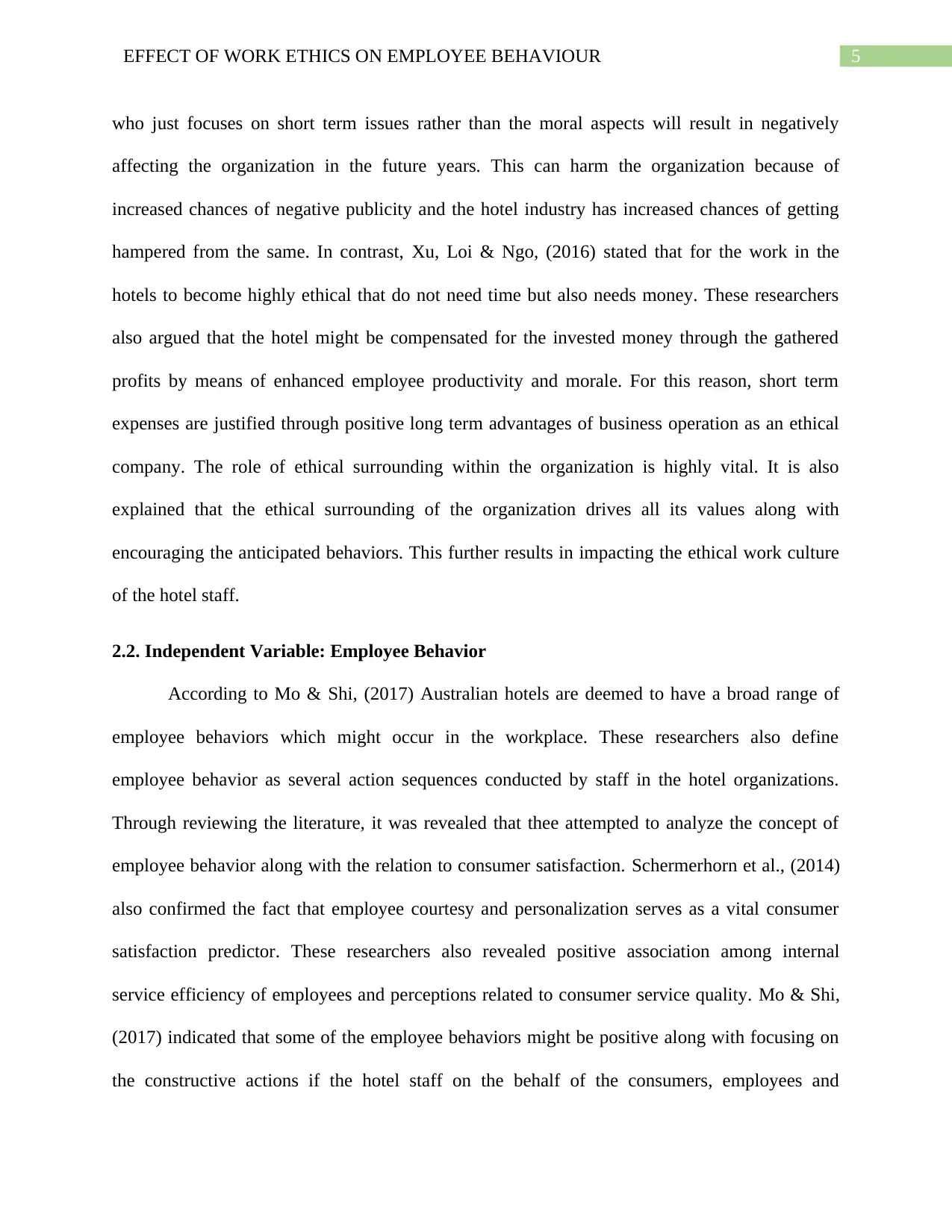
5EFFECT OF WORK ETHICS ON EMPLOYEE BEHAVIOUR
who just focuses on short term issues rather than the moral aspects will result in negatively
affecting the organization in the future years. This can harm the organization because of
increased chances of negative publicity and the hotel industry has increased chances of getting
hampered from the same. In contrast, Xu, Loi & Ngo, (2016) stated that for the work in the
hotels to become highly ethical that do not need time but also needs money. These researchers
also argued that the hotel might be compensated for the invested money through the gathered
profits by means of enhanced employee productivity and morale. For this reason, short term
expenses are justified through positive long term advantages of business operation as an ethical
company. The role of ethical surrounding within the organization is highly vital. It is also
explained that the ethical surrounding of the organization drives all its values along with
encouraging the anticipated behaviors. This further results in impacting the ethical work culture
of the hotel staff.
2.2. Independent Variable: Employee Behavior
According to Mo & Shi, (2017) Australian hotels are deemed to have a broad range of
employee behaviors which might occur in the workplace. These researchers also define
employee behavior as several action sequences conducted by staff in the hotel organizations.
Through reviewing the literature, it was revealed that thee attempted to analyze the concept of
employee behavior along with the relation to consumer satisfaction. Schermerhorn et al., (2014)
also confirmed the fact that employee courtesy and personalization serves as a vital consumer
satisfaction predictor. These researchers also revealed positive association among internal
service efficiency of employees and perceptions related to consumer service quality. Mo & Shi,
(2017) indicated that some of the employee behaviors might be positive along with focusing on
the constructive actions if the hotel staff on the behalf of the consumers, employees and
who just focuses on short term issues rather than the moral aspects will result in negatively
affecting the organization in the future years. This can harm the organization because of
increased chances of negative publicity and the hotel industry has increased chances of getting
hampered from the same. In contrast, Xu, Loi & Ngo, (2016) stated that for the work in the
hotels to become highly ethical that do not need time but also needs money. These researchers
also argued that the hotel might be compensated for the invested money through the gathered
profits by means of enhanced employee productivity and morale. For this reason, short term
expenses are justified through positive long term advantages of business operation as an ethical
company. The role of ethical surrounding within the organization is highly vital. It is also
explained that the ethical surrounding of the organization drives all its values along with
encouraging the anticipated behaviors. This further results in impacting the ethical work culture
of the hotel staff.
2.2. Independent Variable: Employee Behavior
According to Mo & Shi, (2017) Australian hotels are deemed to have a broad range of
employee behaviors which might occur in the workplace. These researchers also define
employee behavior as several action sequences conducted by staff in the hotel organizations.
Through reviewing the literature, it was revealed that thee attempted to analyze the concept of
employee behavior along with the relation to consumer satisfaction. Schermerhorn et al., (2014)
also confirmed the fact that employee courtesy and personalization serves as a vital consumer
satisfaction predictor. These researchers also revealed positive association among internal
service efficiency of employees and perceptions related to consumer service quality. Mo & Shi,
(2017) indicated that some of the employee behaviors might be positive along with focusing on
the constructive actions if the hotel staff on the behalf of the consumers, employees and
⊘ This is a preview!⊘
Do you want full access?
Subscribe today to unlock all pages.

Trusted by 1+ million students worldwide
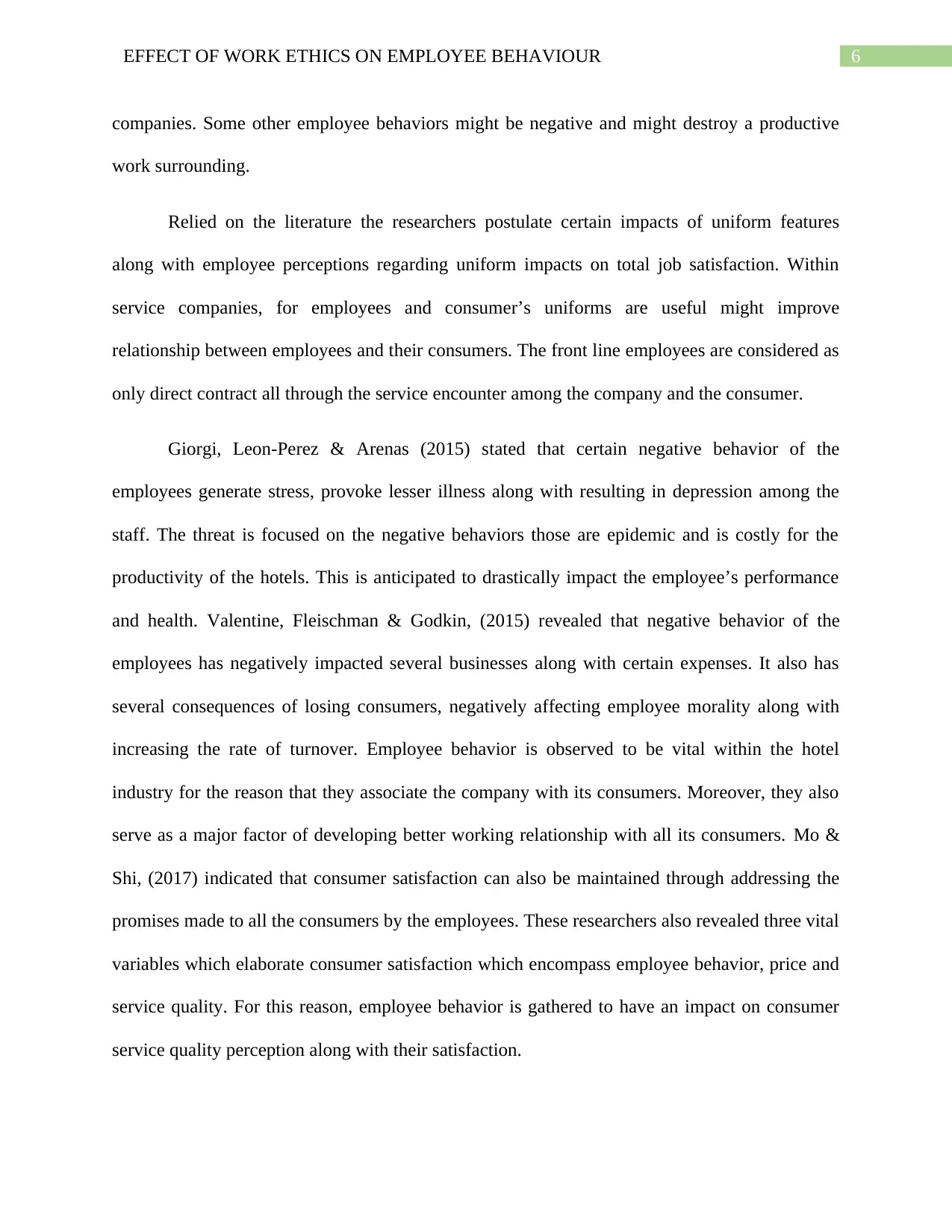
6EFFECT OF WORK ETHICS ON EMPLOYEE BEHAVIOUR
companies. Some other employee behaviors might be negative and might destroy a productive
work surrounding.
Relied on the literature the researchers postulate certain impacts of uniform features
along with employee perceptions regarding uniform impacts on total job satisfaction. Within
service companies, for employees and consumer’s uniforms are useful might improve
relationship between employees and their consumers. The front line employees are considered as
only direct contract all through the service encounter among the company and the consumer.
Giorgi, Leon-Perez & Arenas (2015) stated that certain negative behavior of the
employees generate stress, provoke lesser illness along with resulting in depression among the
staff. The threat is focused on the negative behaviors those are epidemic and is costly for the
productivity of the hotels. This is anticipated to drastically impact the employee’s performance
and health. Valentine, Fleischman & Godkin, (2015) revealed that negative behavior of the
employees has negatively impacted several businesses along with certain expenses. It also has
several consequences of losing consumers, negatively affecting employee morality along with
increasing the rate of turnover. Employee behavior is observed to be vital within the hotel
industry for the reason that they associate the company with its consumers. Moreover, they also
serve as a major factor of developing better working relationship with all its consumers. Mo &
Shi, (2017) indicated that consumer satisfaction can also be maintained through addressing the
promises made to all the consumers by the employees. These researchers also revealed three vital
variables which elaborate consumer satisfaction which encompass employee behavior, price and
service quality. For this reason, employee behavior is gathered to have an impact on consumer
service quality perception along with their satisfaction.
companies. Some other employee behaviors might be negative and might destroy a productive
work surrounding.
Relied on the literature the researchers postulate certain impacts of uniform features
along with employee perceptions regarding uniform impacts on total job satisfaction. Within
service companies, for employees and consumer’s uniforms are useful might improve
relationship between employees and their consumers. The front line employees are considered as
only direct contract all through the service encounter among the company and the consumer.
Giorgi, Leon-Perez & Arenas (2015) stated that certain negative behavior of the
employees generate stress, provoke lesser illness along with resulting in depression among the
staff. The threat is focused on the negative behaviors those are epidemic and is costly for the
productivity of the hotels. This is anticipated to drastically impact the employee’s performance
and health. Valentine, Fleischman & Godkin, (2015) revealed that negative behavior of the
employees has negatively impacted several businesses along with certain expenses. It also has
several consequences of losing consumers, negatively affecting employee morality along with
increasing the rate of turnover. Employee behavior is observed to be vital within the hotel
industry for the reason that they associate the company with its consumers. Moreover, they also
serve as a major factor of developing better working relationship with all its consumers. Mo &
Shi, (2017) indicated that consumer satisfaction can also be maintained through addressing the
promises made to all the consumers by the employees. These researchers also revealed three vital
variables which elaborate consumer satisfaction which encompass employee behavior, price and
service quality. For this reason, employee behavior is gathered to have an impact on consumer
service quality perception along with their satisfaction.
Paraphrase This Document
Need a fresh take? Get an instant paraphrase of this document with our AI Paraphraser
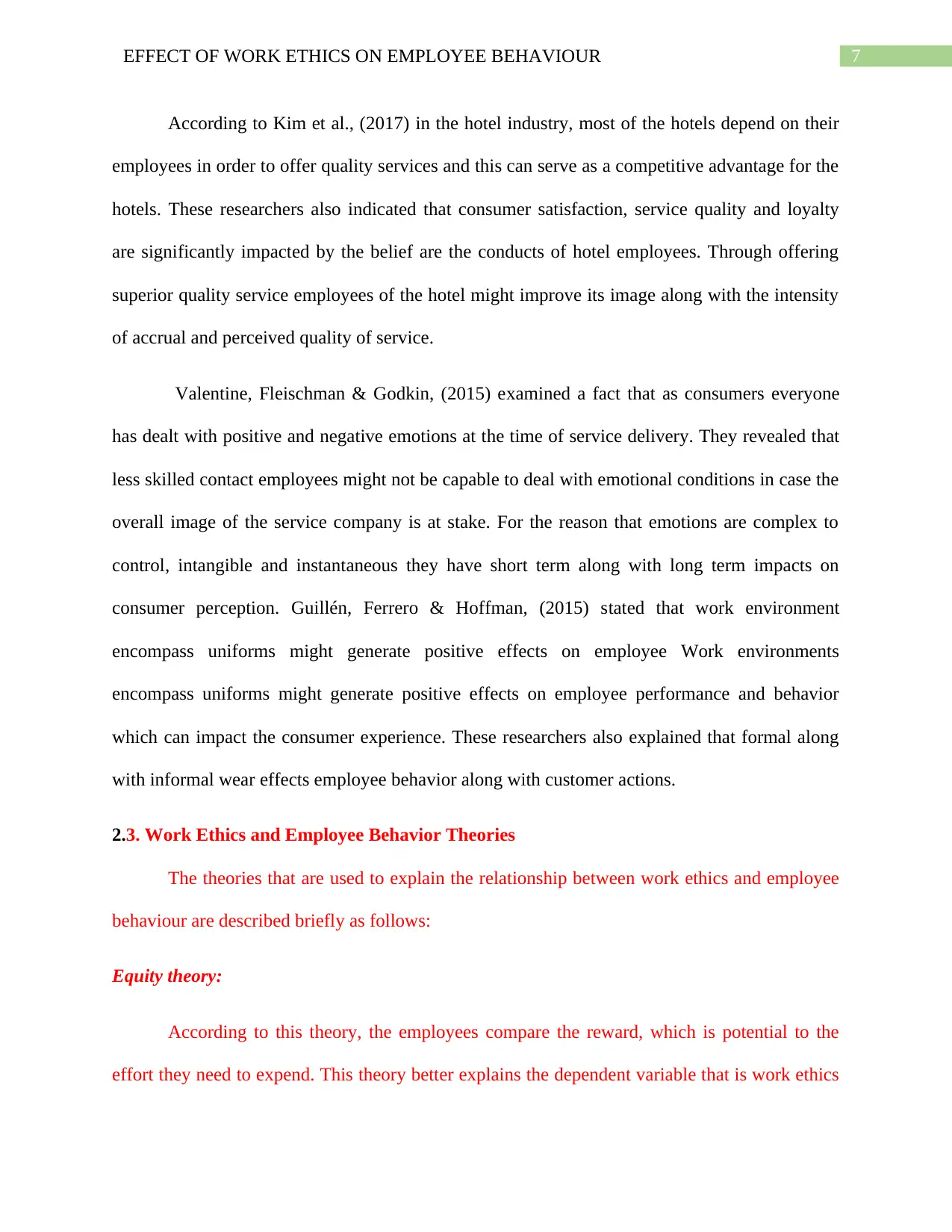
7EFFECT OF WORK ETHICS ON EMPLOYEE BEHAVIOUR
According to Kim et al., (2017) in the hotel industry, most of the hotels depend on their
employees in order to offer quality services and this can serve as a competitive advantage for the
hotels. These researchers also indicated that consumer satisfaction, service quality and loyalty
are significantly impacted by the belief are the conducts of hotel employees. Through offering
superior quality service employees of the hotel might improve its image along with the intensity
of accrual and perceived quality of service.
Valentine, Fleischman & Godkin, (2015) examined a fact that as consumers everyone
has dealt with positive and negative emotions at the time of service delivery. They revealed that
less skilled contact employees might not be capable to deal with emotional conditions in case the
overall image of the service company is at stake. For the reason that emotions are complex to
control, intangible and instantaneous they have short term along with long term impacts on
consumer perception. Guillén, Ferrero & Hoffman, (2015) stated that work environment
encompass uniforms might generate positive effects on employee Work environments
encompass uniforms might generate positive effects on employee performance and behavior
which can impact the consumer experience. These researchers also explained that formal along
with informal wear effects employee behavior along with customer actions.
2.3. Work Ethics and Employee Behavior Theories
The theories that are used to explain the relationship between work ethics and employee
behaviour are described briefly as follows:
Equity theory:
According to this theory, the employees compare the reward, which is potential to the
effort they need to expend. This theory better explains the dependent variable that is work ethics
According to Kim et al., (2017) in the hotel industry, most of the hotels depend on their
employees in order to offer quality services and this can serve as a competitive advantage for the
hotels. These researchers also indicated that consumer satisfaction, service quality and loyalty
are significantly impacted by the belief are the conducts of hotel employees. Through offering
superior quality service employees of the hotel might improve its image along with the intensity
of accrual and perceived quality of service.
Valentine, Fleischman & Godkin, (2015) examined a fact that as consumers everyone
has dealt with positive and negative emotions at the time of service delivery. They revealed that
less skilled contact employees might not be capable to deal with emotional conditions in case the
overall image of the service company is at stake. For the reason that emotions are complex to
control, intangible and instantaneous they have short term along with long term impacts on
consumer perception. Guillén, Ferrero & Hoffman, (2015) stated that work environment
encompass uniforms might generate positive effects on employee Work environments
encompass uniforms might generate positive effects on employee performance and behavior
which can impact the consumer experience. These researchers also explained that formal along
with informal wear effects employee behavior along with customer actions.
2.3. Work Ethics and Employee Behavior Theories
The theories that are used to explain the relationship between work ethics and employee
behaviour are described briefly as follows:
Equity theory:
According to this theory, the employees compare the reward, which is potential to the
effort they need to expend. This theory better explains the dependent variable that is work ethics
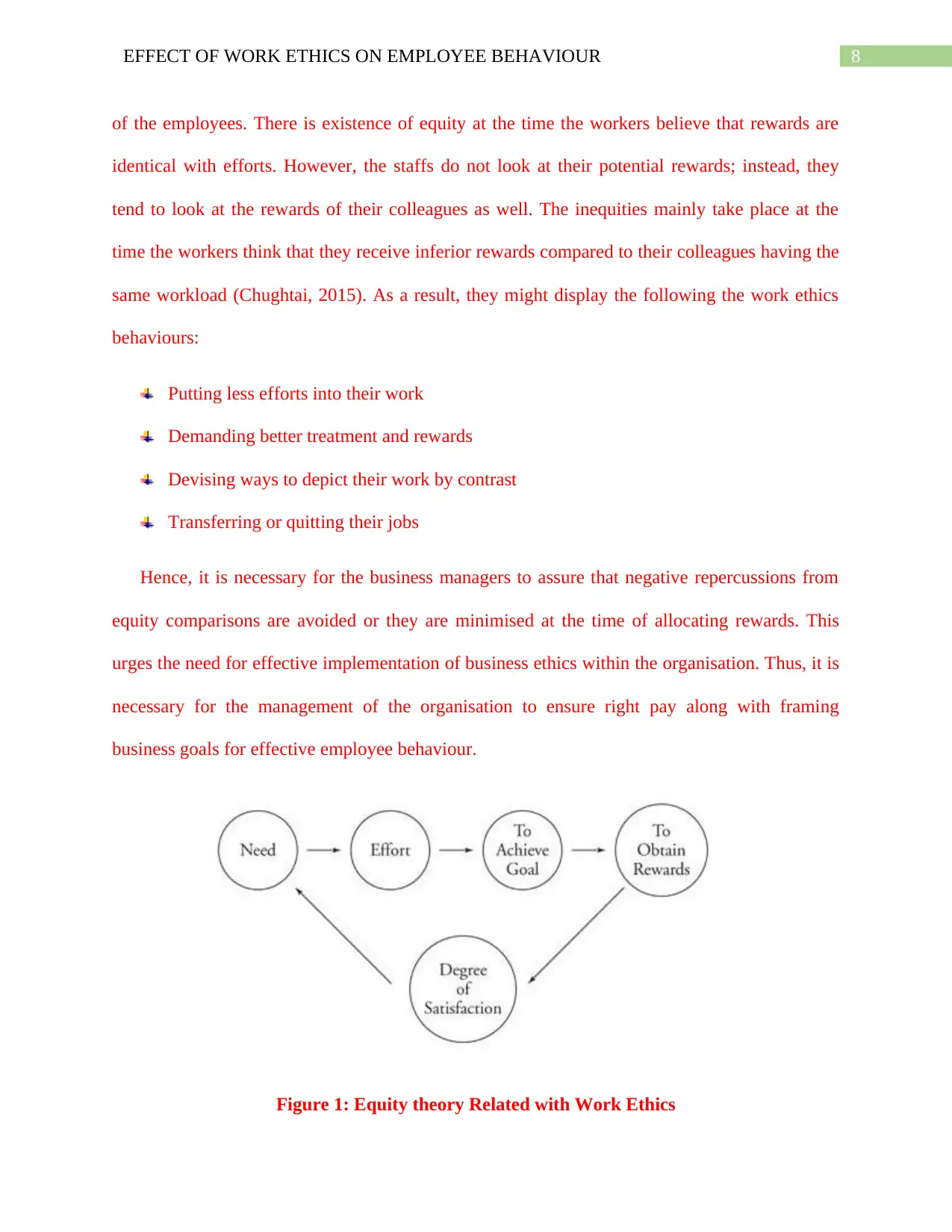
8EFFECT OF WORK ETHICS ON EMPLOYEE BEHAVIOUR
of the employees. There is existence of equity at the time the workers believe that rewards are
identical with efforts. However, the staffs do not look at their potential rewards; instead, they
tend to look at the rewards of their colleagues as well. The inequities mainly take place at the
time the workers think that they receive inferior rewards compared to their colleagues having the
same workload (Chughtai, 2015). As a result, they might display the following the work ethics
behaviours:
Putting less efforts into their work
Demanding better treatment and rewards
Devising ways to depict their work by contrast
Transferring or quitting their jobs
Hence, it is necessary for the business managers to assure that negative repercussions from
equity comparisons are avoided or they are minimised at the time of allocating rewards. This
urges the need for effective implementation of business ethics within the organisation. Thus, it is
necessary for the management of the organisation to ensure right pay along with framing
business goals for effective employee behaviour.
Figure 1: Equity theory Related with Work Ethics
of the employees. There is existence of equity at the time the workers believe that rewards are
identical with efforts. However, the staffs do not look at their potential rewards; instead, they
tend to look at the rewards of their colleagues as well. The inequities mainly take place at the
time the workers think that they receive inferior rewards compared to their colleagues having the
same workload (Chughtai, 2015). As a result, they might display the following the work ethics
behaviours:
Putting less efforts into their work
Demanding better treatment and rewards
Devising ways to depict their work by contrast
Transferring or quitting their jobs
Hence, it is necessary for the business managers to assure that negative repercussions from
equity comparisons are avoided or they are minimised at the time of allocating rewards. This
urges the need for effective implementation of business ethics within the organisation. Thus, it is
necessary for the management of the organisation to ensure right pay along with framing
business goals for effective employee behaviour.
Figure 1: Equity theory Related with Work Ethics
⊘ This is a preview!⊘
Do you want full access?
Subscribe today to unlock all pages.

Trusted by 1+ million students worldwide
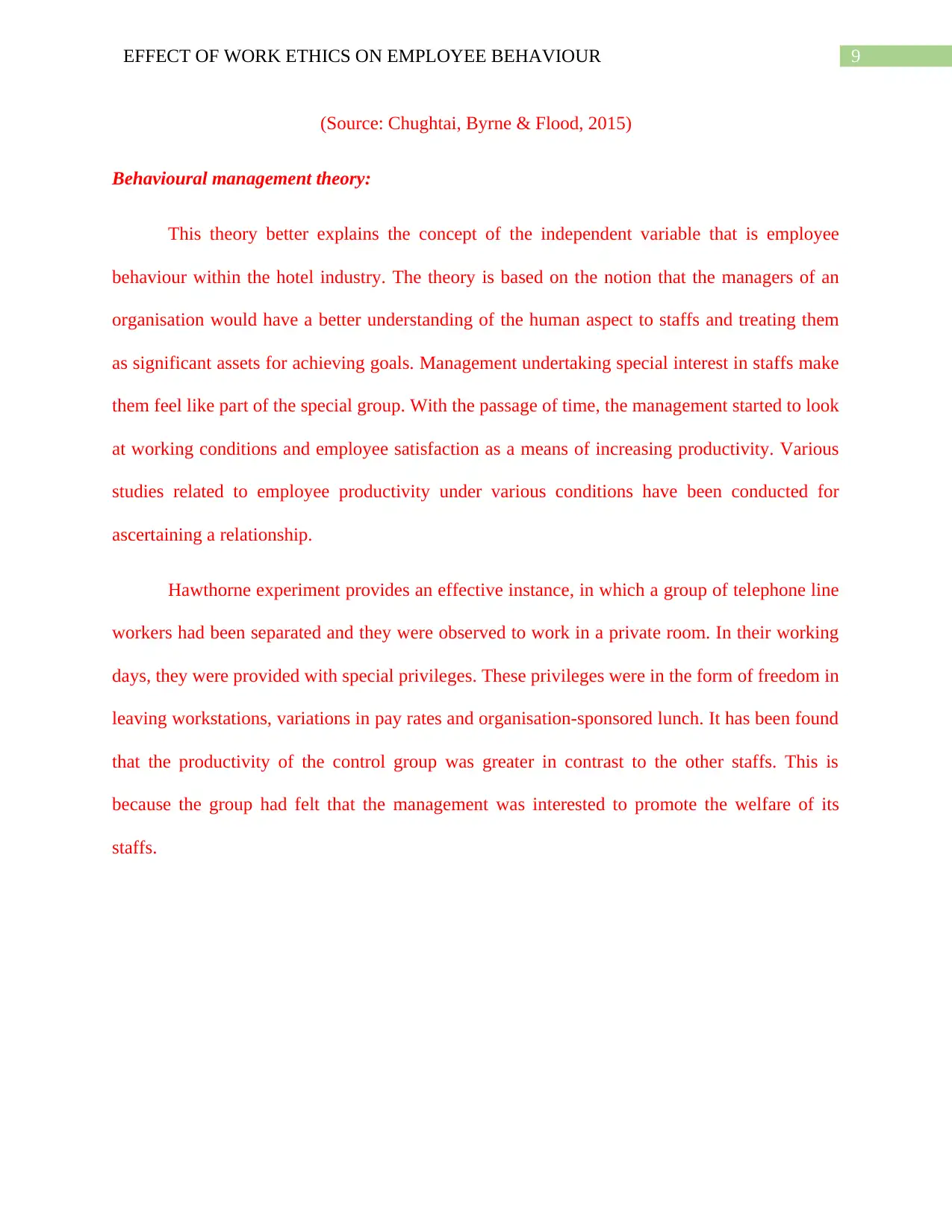
9EFFECT OF WORK ETHICS ON EMPLOYEE BEHAVIOUR
(Source: Chughtai, Byrne & Flood, 2015)
Behavioural management theory:
This theory better explains the concept of the independent variable that is employee
behaviour within the hotel industry. The theory is based on the notion that the managers of an
organisation would have a better understanding of the human aspect to staffs and treating them
as significant assets for achieving goals. Management undertaking special interest in staffs make
them feel like part of the special group. With the passage of time, the management started to look
at working conditions and employee satisfaction as a means of increasing productivity. Various
studies related to employee productivity under various conditions have been conducted for
ascertaining a relationship.
Hawthorne experiment provides an effective instance, in which a group of telephone line
workers had been separated and they were observed to work in a private room. In their working
days, they were provided with special privileges. These privileges were in the form of freedom in
leaving workstations, variations in pay rates and organisation-sponsored lunch. It has been found
that the productivity of the control group was greater in contrast to the other staffs. This is
because the group had felt that the management was interested to promote the welfare of its
staffs.
(Source: Chughtai, Byrne & Flood, 2015)
Behavioural management theory:
This theory better explains the concept of the independent variable that is employee
behaviour within the hotel industry. The theory is based on the notion that the managers of an
organisation would have a better understanding of the human aspect to staffs and treating them
as significant assets for achieving goals. Management undertaking special interest in staffs make
them feel like part of the special group. With the passage of time, the management started to look
at working conditions and employee satisfaction as a means of increasing productivity. Various
studies related to employee productivity under various conditions have been conducted for
ascertaining a relationship.
Hawthorne experiment provides an effective instance, in which a group of telephone line
workers had been separated and they were observed to work in a private room. In their working
days, they were provided with special privileges. These privileges were in the form of freedom in
leaving workstations, variations in pay rates and organisation-sponsored lunch. It has been found
that the productivity of the control group was greater in contrast to the other staffs. This is
because the group had felt that the management was interested to promote the welfare of its
staffs.
Paraphrase This Document
Need a fresh take? Get an instant paraphrase of this document with our AI Paraphraser
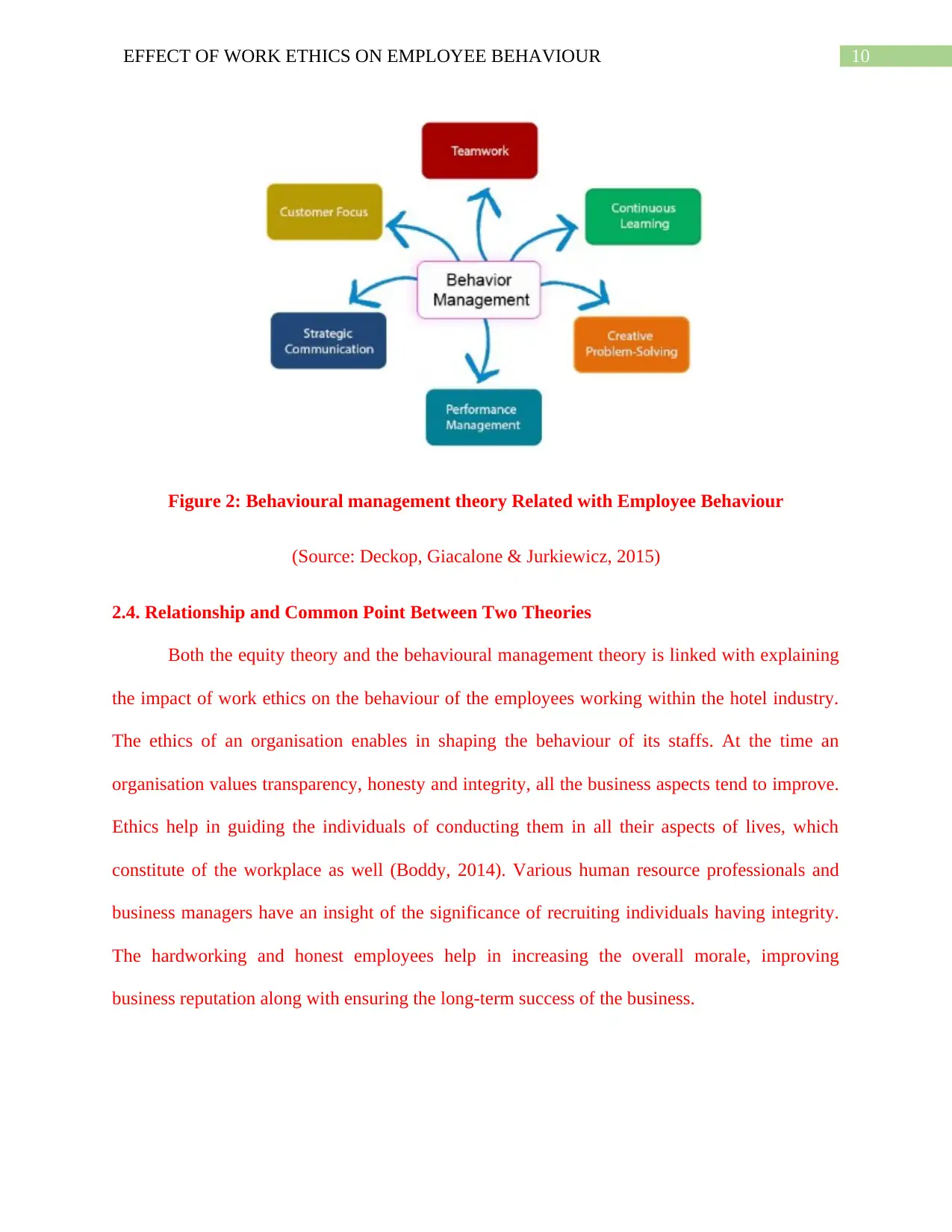
10EFFECT OF WORK ETHICS ON EMPLOYEE BEHAVIOUR
Figure 2: Behavioural management theory Related with Employee Behaviour
(Source: Deckop, Giacalone & Jurkiewicz, 2015)
2.4. Relationship and Common Point Between Two Theories
Both the equity theory and the behavioural management theory is linked with explaining
the impact of work ethics on the behaviour of the employees working within the hotel industry.
The ethics of an organisation enables in shaping the behaviour of its staffs. At the time an
organisation values transparency, honesty and integrity, all the business aspects tend to improve.
Ethics help in guiding the individuals of conducting them in all their aspects of lives, which
constitute of the workplace as well (Boddy, 2014). Various human resource professionals and
business managers have an insight of the significance of recruiting individuals having integrity.
The hardworking and honest employees help in increasing the overall morale, improving
business reputation along with ensuring the long-term success of the business.
Figure 2: Behavioural management theory Related with Employee Behaviour
(Source: Deckop, Giacalone & Jurkiewicz, 2015)
2.4. Relationship and Common Point Between Two Theories
Both the equity theory and the behavioural management theory is linked with explaining
the impact of work ethics on the behaviour of the employees working within the hotel industry.
The ethics of an organisation enables in shaping the behaviour of its staffs. At the time an
organisation values transparency, honesty and integrity, all the business aspects tend to improve.
Ethics help in guiding the individuals of conducting them in all their aspects of lives, which
constitute of the workplace as well (Boddy, 2014). Various human resource professionals and
business managers have an insight of the significance of recruiting individuals having integrity.
The hardworking and honest employees help in increasing the overall morale, improving
business reputation along with ensuring the long-term success of the business.
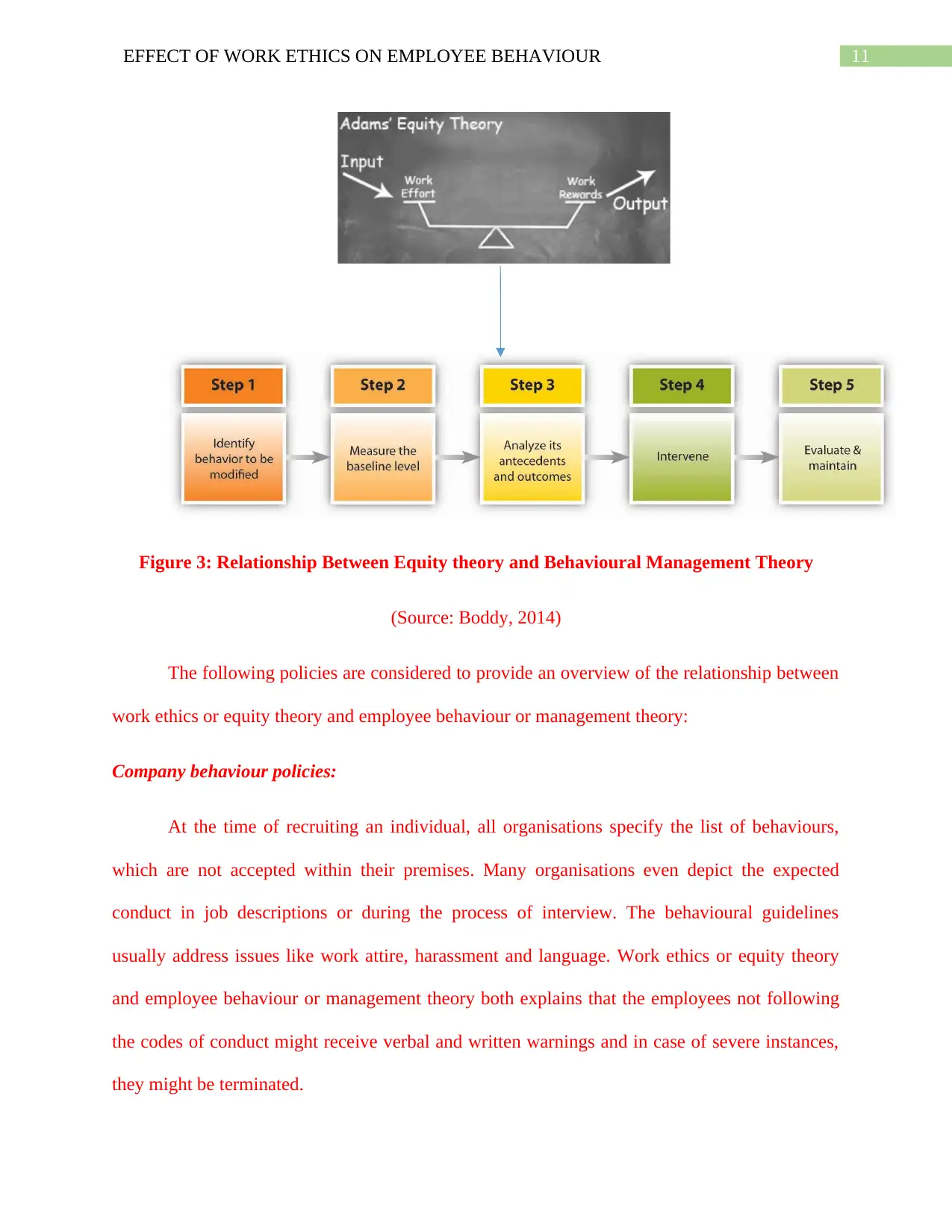
11EFFECT OF WORK ETHICS ON EMPLOYEE BEHAVIOUR
Figure 3: Relationship Between Equity theory and Behavioural Management Theory
(Source: Boddy, 2014)
The following policies are considered to provide an overview of the relationship between
work ethics or equity theory and employee behaviour or management theory:
Company behaviour policies:
At the time of recruiting an individual, all organisations specify the list of behaviours,
which are not accepted within their premises. Many organisations even depict the expected
conduct in job descriptions or during the process of interview. The behavioural guidelines
usually address issues like work attire, harassment and language. Work ethics or equity theory
and employee behaviour or management theory both explains that the employees not following
the codes of conduct might receive verbal and written warnings and in case of severe instances,
they might be terminated.
Figure 3: Relationship Between Equity theory and Behavioural Management Theory
(Source: Boddy, 2014)
The following policies are considered to provide an overview of the relationship between
work ethics or equity theory and employee behaviour or management theory:
Company behaviour policies:
At the time of recruiting an individual, all organisations specify the list of behaviours,
which are not accepted within their premises. Many organisations even depict the expected
conduct in job descriptions or during the process of interview. The behavioural guidelines
usually address issues like work attire, harassment and language. Work ethics or equity theory
and employee behaviour or management theory both explains that the employees not following
the codes of conduct might receive verbal and written warnings and in case of severe instances,
they might be terminated.
⊘ This is a preview!⊘
Do you want full access?
Subscribe today to unlock all pages.

Trusted by 1+ million students worldwide
1 out of 18
Related Documents
Your All-in-One AI-Powered Toolkit for Academic Success.
+13062052269
info@desklib.com
Available 24*7 on WhatsApp / Email
![[object Object]](/_next/static/media/star-bottom.7253800d.svg)
Unlock your academic potential
Copyright © 2020–2026 A2Z Services. All Rights Reserved. Developed and managed by ZUCOL.





